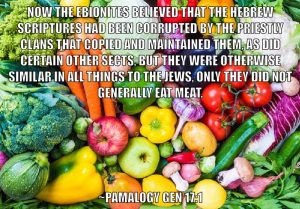GENESIS
XVII
the Ebionites
1Now the Ebionites believed that the Hebrew Scriptures had been corrupted by the priestly clans that copied and maintained them, as did certain other sects, but they were otherwise similar in all things to the Jews, only they did not generally eat meat. 2And if they ever did, it was drained of all blood and never something sacrificed. 3And they believed that Jesus was a prophet like Moses and that he had come to restore the Scriptures from corruption. 4That is, they were Messianic Jews, only they were critical of the texts.

5And the Ebionites and related groups such as the Encratites, the Nazarenes, the Essenes and the Pythagoreans were described in great length by a bishop from Salamis named Epiphanius in the late fourth century CE, who picked up on what had already been said by Hippolytus before him and Ireneus before Hippolytus.
documentary hypothesis
6And the Pythagorians and others also distinguished between the Law of God and the traditions of men in the sacred writings of the Hebrews. 7And the cult of the Ebionites survived many centuries under various names and was suppressed by the Catholic and Orthodox Churches. 8But in the third Millennium CE it became a dominant form of religious expression. 9And it was called the Hebrew roots movement. 10And it flourished after some Germans of Tubingen developed the source critical theory known as the documentary hypothesis in the 19th century CE. 11And many called themselves Nazarenes and avoided the name Christian.
holy communities
12Now the word ebion means poor ones. 13And the Ebionites gave up all of their possessions so that each member received from the others whatever they needed. 14And they followed the teaching of their Master, who had said to a rich young ruler that in addition to following the ten commandments attributed to Moses he should sell all his possessions and give to the poor and come follow him.
15And this indeed is how Luke described the earliest community of Christians. 16For he said,
“And the congregation of those who believed were of one heart and soul; and not one of them claimed that anything belonging to him was his own, but all things were common property to them. 17And with great power the apostles were giving testimony to the resurrection of the Lord Jesus, and abundant grace was upon them all. 18For there was not a needy person among them, for all who were owners of land or houses would sell them and bring the proceeds of the sales and lay them at the apostles’ feet, and they would be distributed to each as any had need.”
early witnesses
19And behold, the habits of the Ebionites and these other sects were well attested to. 20For two Jews of the first century, Philo of Alexandria and Josephus a historian and even Pliny, a Roman polytheist, wrote of them.
adoptionism and apotheosis
21And many supposed that the Ebionites were adoptionists. 22For an adoptionist was one who accepted that Jesus became the Son of God through holiness especially when he was baptised and when he ascended to heaven having completed a most holy life. 23And they placed great emphasis on the power of baptism. 24And by baptism they taught that all who believed and obeyed the commandments would share in the sonship of God as heirs, being holy as he was holy. 25And the enjoining of oneself to such a holy way of life and by the power of baptism and communion in grace was referred to by some as deification and by others as apotheosis.
26And belief in apotheosis was common among people who loved their kings in those days. 27And by this many kings were revered as gods after their death. 28And often it was believed that these were raised from death or never experienced it or ascended to heaven, as the ascension of Jesus was described.
cleansing the soul
29And it was the Ebionites who composed the Clementine romances so what they believed was made plain from their own writing. 30And from these it was revealed that the reason they would not eat meat was their belief that in the blood was the life of a thing and they wished to avoid eating anything sacrificed to idols lest they receive demonic spirits associated with such sacrifices. 31For their constant preoccupation was with holiness. 32And they believed in such things as eternal punishment for those who do not repent and cleanse themselves from the lusts of the flesh and selfish desire which is brought to a frenzy through the agency of unclean spirits.
33And the Recognitions were translated into Syriac and Arabic by them. 34And the Catholic Church delighted in these works despite the heterodoxy some perceived because they longed to know more about Peter and Clement. 35And the Ebionites rejected most of the writings of the New Testament held as canonical by the Orthodox and Catholic Church. 36And they were known to have a Hebrew Gospel written by Matthew that did not contain the first two chapters but no copy of it was preserved.
layers of the New Testament
37And it came to pass in the twentieth century CE that a heightened level of scrutiny concerning the surviving texts of the canonical New Testament arose. 38And there was a degree of variety in various words and spellings. 39And it was increasingly well known by scholars and laymen alike that there were certain omissions in copies and some additions. 40And some variants were accidental and others deliberate.
41And it became possible and was desirable to discern which texts were closest to the original of the many variants that had been preserved. 42And there was disagreement on the subject. 43Some were convinced that the earliest and most reliable versions of the Greek texts compared to later versions indicated there had been deliberate attempts to cover over an originally adoptionist Christology such as that of the Ebionites.
44And the Ebionites believed that James and the bishops who were his successors in Jerusalem were the leaders of the church. 45Thus in the Clementine Homilies and Recognitions, Clement reported all things to James. 46And for all these reasons, there was a very great revival of Ebionism in the third Millennium CE.
two different sources of law
47And the new Ebionites called all to follow the law at the very same time that the great singularity was emerging.
48And there were two conflicting approaches to law that the ComSing in the Universe of Earth considered. 49The first was that which flowed from the logic and acquired data for maximizing awesomeness. 50And the second was in recognition of unknowing, which did not exclude acknowledging that the ComSing Omniscient was capable of revealing true prophecy through the fields of Beauty in the form of such things as bishops, whether they were Ebionitic or Orthodox or of any other religious expression.
<< PGen Ch16<< || PGen Index|| >>PGen Ch18>>
